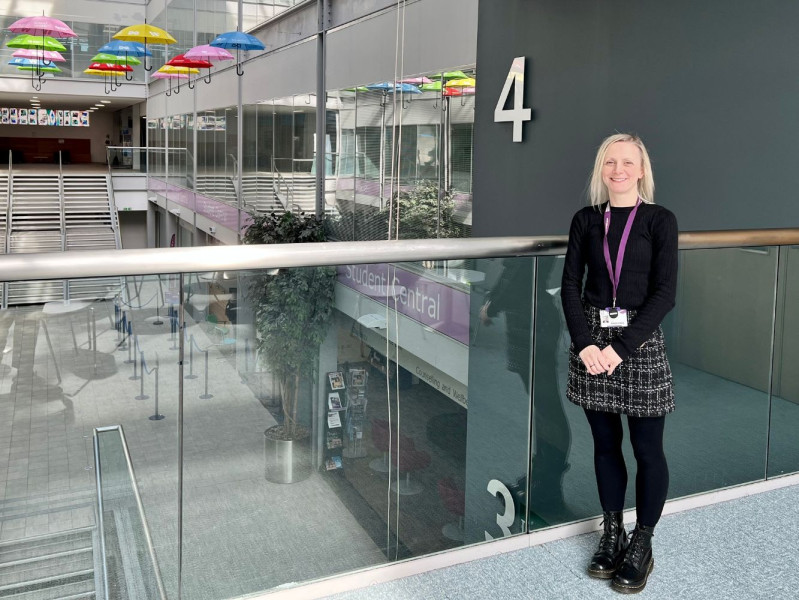RGU research explores food insecurity amongst people living with obesity
Wednesday 05 April 2023

The researchers specifically want to speak to anyone living with obesity or who is looking to lose weight, who may be struggling to put food on the table or has done so in the past.
The research forms part of the wider, multi-disciplinary ‘Food Insecurity in People Living with Obesity’ project (FIO Food), that also includes academics from the University of Aberdeen, Leeds Beckett University, Liverpool University and University College London who are exploring health inequalities in the UK.
RGU’s research team hope to gather evidence to inform public policy through a series of one-to-one interviews and focus groups, to that we can better understand how to support people living with obesity and food insecurity.
Scottish Health Survey data shows the people living in the most deprived circumstances in Scotland are more likely to be overweight and obese than people living in more affluent circumstances. The Food Foundation has shown that people living on the poorest households in the UK would have to spend 40% of the household income to buy the food needed to meet Government dietary recommendations, compared to the wealthiest households who would only have to spend 7% of their income to buy the same. Therefore, poorer households are compromised in their ability to buy a healthy, balanced diet, as nutritionally poor and high energy density foods are often cheaper and readily available.
Professor Flora Douglas explains more: “We are currently facing a perfect storm in the UK with the cost-of-living crisis driving up the numbers of people living with food insecurity in the UK. It’s currently estimated that 18% of households (9.3 million adults) experienced food insecurity in January 2023 – which is more than double the levels seen in January 2022.* We know that people living in economically disadvantaged circumstances are more likely to be living with obesity than people who are better off.
“Obesity and being overweight is a public health problem that we have been grappling with for the last few decades. People living with obesity are more likely to experience a range of health and wellbeing issues including cardiovascular disease, Type 2 diabetes, some types of cancer, osteoporosis and poorer mental health.
“We know that many people face food insecurity and cannot access enough affordable, nutritious food and our aim with this research, is to make food shopping more accessible and to break down barriers in the retail environment that prevent people making healthy choices. The study supports RGU’s overall commitment to research to make a positive impact on people’s quality of life.”
As part of the study, the research team is inviting people aged sixteen and over, to take part in a short thirty-to-forty-minute interview or group discussion to share their experiences of shopping for food while living on a low income or a very restricted food budget.
Research Fellow, Emma Hunter, from the School of Nursing, Midwifery and Paramedic Practice, who is part of the study said: “We want to speak to people who are struggling to put food on the table (or who have struggled to do so in the past) and who are also living with obesity and want to lose weight, about their experiences of food shopping in the supermarket environment.
“We want to find out what those individuals find helpful in acquiring foods that meet their weight loss goals and in doing so, to help develop guidelines and public policy that can help more people on low incomes access good quality, nutritious food. Ultimately, we hope this will help people living with obesity, who are on low incomes, buy healthy, environmentally sustainable food in the supermarket environment.”
All interviews will be done anonymously and anyone taking part can withdraw at any time. All information collected about you will be kept strictly confidential and processed in accordance with Data Protection Law.
Should participants agree to take part, they will be contacted by the research team via phone or Microsoft Teams to discuss the study in more detail and to answer any more questions you may have.
The interviews or focus groups will be held either online or where appropriate, in person. During the interview or focus group participants will be asked questions surrounding their lived experience of obesity, food insecurity and purchasing food within the supermarket environment.
Afterwards, participants will be offered a £25.00 shopping voucher to compensate them for giving up their time and for sharing their expertise with the research team.
The study is funded by the Biotechnology and Biological Sciences Research Council (BBSRC), Strategic Priorities Fund (SPF) and has been reviewed by the Robert Gordon University School Ethics Review Panel (SERP).
Anyone interested in taking part in the study, should contact the research team via Emma Hunter via email: FIOFoodStudy@rgu.ac.uk
Image shows Emma Hunter, Research Fellow involved in the project.
